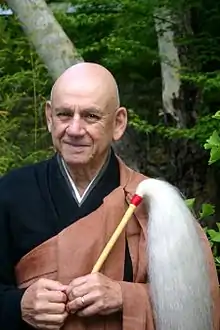
Sojun Mel Weitsman wielding a hossu
A hossu (払子, Chinese: Fuzi, 拂子; Sanskrit: vālavyajana) is a short staff of wood or bamboo with bundled hair (of a cow, horse, or yak) or hemp wielded by a Zen Buddhist priest.[1] Often described as a "fly whisk" or "fly shooer", the stick is believed to protect the wielder from desire and also works as a way of ridding areas of flies without killing them.[2] The hossu is regarded as symbolic of a Zen teacher's authority to teach and transmit Buddha Dharma to others, and is frequently passed from one teacher to the next.[3]
References
- ↑ Mol, Serge (2003). Classical Weaponry of Japan: Special Weapons and Tactics of the Martial Arts. Tokyo: Kodansha International. p. 203. ISBN 4-7700-2941-1. OCLC 238851185.
- ↑ Gill, Robin D. (2004). Fly-ku!: A Theme from In Praise of Olde Haiku with Many More Poems and Fine Elaboration. Key Biscayne, FL: Paraverse Press. pp. 76, pp. 85–86. ISBN 0-9742618-4-X.
- ↑ Baroni, Helen J. (2002). The Illustrated Encyclopedia of Zen Buddhism. The Rosen Publishing Group, Inc. p. 139. ISBN 0-8239-2240-5. OCLC 42680558.
This article is issued from Wikipedia. The text is licensed under Creative Commons - Attribution - Sharealike. Additional terms may apply for the media files.